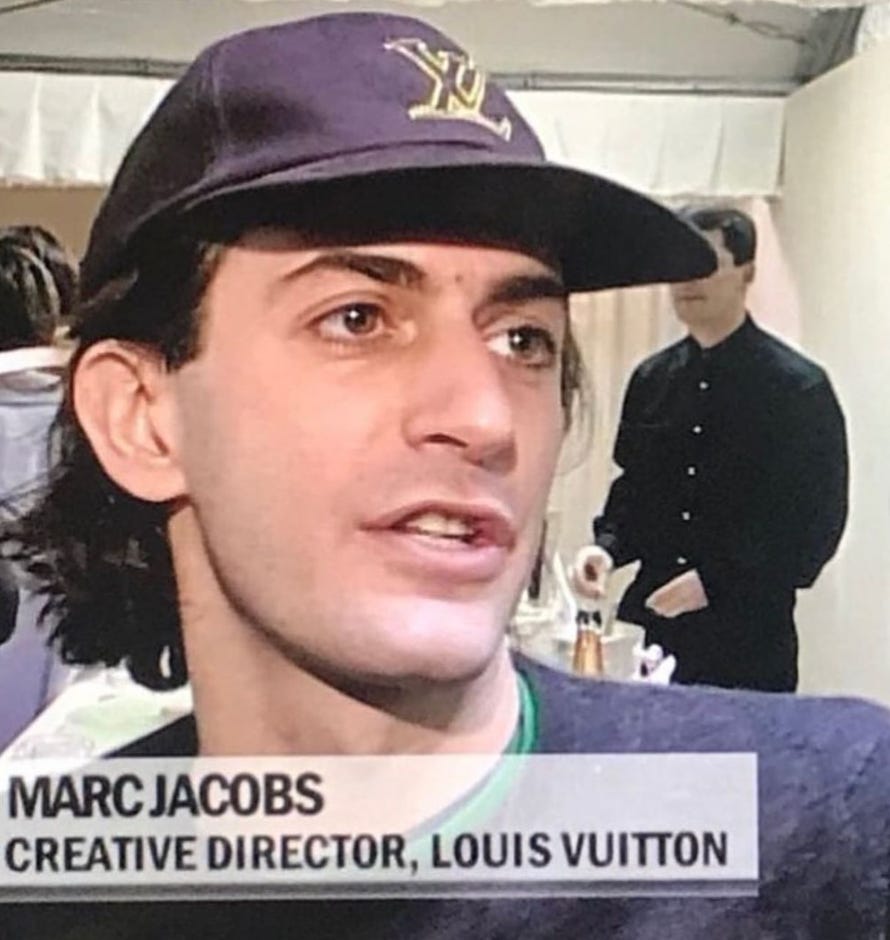*This post was written ahead of the Yeezy Paris fashion show (what a difference a week makes). Whatever Ye’s intention was behind sending the message of White Lives Matter down the runways, whether performance art, mass trolling, reclaiming a narrative or intentionally sinister, we’ll never know. What we do know is this message and subsequent fallout on social from Ye’s account has been violent and chaotic. We have a lot more to say on this and we’ll be unpacking our parasocial relationships with celebrities, our need for redemption arcs and ultimately our short-term memories when brands/people do shit and we choose to forget. We’re all guilty. We’re taking a moment to be less shit and turn inward on our own relationships with these gargantuan cultural icons (in the form of celebrity or high-end fashion brands), and our willingness to embrace and disgrace, as our values align and then misalign on a loop. And even more dangerously, the distracting consequences and the space they can steal in our heads and our media when revolutions are happening or our countries’ infrastructure is being quietly dismantled. Till next time misfits.
I want to talk about Kanye, or more pressingly, Kanye’s relationship to brands and intellectual property.
Context, in case you don’t follow Mr West on instagram and/or live outside of the vortex that is the internet (respect, but also how are you reading this???):
Kanye is not happy. He has been dragging his collaborators (mainly Gap and Adidas) and letting us know he is sick of people stealing his designs.

Kanye’s anger mirrors the way I felt after doing many a (unpaid) fashion internship, and made me think that the collaboration process (between brand and creator) operates in a very similar way:
Sold as a “Great Opportunity”
Capitalises on a fear of replaceability
Will leave you feeling undervalued and disrespected
Big input of energy with minimal output
Although public shaming of collaborators, friends, family and sometimes even cartoon pigs, is something that Kanye has become accustomed to, he does pose an interesting question about ownership and creativity:
Can big corporations and brands ever be more than just appropriators of culture? and can we ever truly own our ideas and creative outputs?
Ye says in one of his posts “THIS WAR WASN’T ABOUT MONEY, IT WAS ABOUT CONTROL”
“Control”... Our idea of ownership is intrinsically connected to the idea of control. (++ control = ++ ownership). As we live in a time where decentralisation is at the forefront of public conversation we are constantly challenging the concept of ownership and control of our intellectual property.
Individuals are both giving up ownership (Grimes selling a fragment of her soul, Holly Herndon creating a DAO of her voice, and Ye himself creating a stem player that allows for shared ownership of his music) and taking back control (Britney is finally free and 21 Savage signs a 100% ownership deal with Epic records) reflecting a sense of experimentation and play to find an equilibrium of power.
In this case perhaps the question isn’t how can we truly own our ideas and creative outputs - but how can we reframe our relationship with ownership to exist outside of control.

Gap and Adidas did not only want control over the products created as part of their collaboration, but also any “products under the Yeezy trademarks or Ye’s likeness or any other identifiable attribute feature or indica of Ye (e.g. Donda, Pablo or Jesus Walks)” as mentioned in a summary of restrictions shared by Kanye on instagram.
This level of control becomes a colonisation of Ye’s creativity, again reflecting how little brands like Gaps respect the Black creatives they need so desperately for cultural relevance (cc. Telfar).
Something interesting that came out of Kanye’s frustrations, was that he started to live brainstorm a new Yeezy world. Amplifying “meta guerrilla” tactics on instagram, he asked his peers and followers to help build a new Yeezy paradigm including Yeezy stores, factories and even a campus.

If Kanye is the appropriate leader of a new systemic infrastructure is arguable, but in a way he broke down the “3rd wall” between audience and brand - dismantling a system which often takes from the cultures it profits off. Furthermore, he did it right before our eyes.
He took back control by giving up control … maybe something interesting that brands can learn from?
In an interview with Bloomberg where Kanye said “It’s fine. I made the company's money. The companies made me money. We created ideas that will change apparel forever. Like the round jacket, the foam runner, the slides that have changed the shoe industry. Now it’s time for Ye to make the new industry. No more companies standing in between me and the audience.”
What Kanye and so many creatives have always been asking for is agency. Agency to create on their terms. Freedom to express themselves with access to the resources they need. They are looking for people to invest in them and the growth of their ideas. Creatives and collaborators today - from grads to grammy award winners - are looking for more than just a platform. They are looking for a new type of collaboration that offers mutual energy and results in a long term way.
But the filter of control is what I think is holding both brands and individuals back.
The next generation are yearning for a more socialistic and collective approach to creation (see our newsletter on anti-capitalist youth), they are looking to actively participate in the brands they consume. So when Kanye says, “It’s time for Ye to make the new industry” - that’s where he plays corporate America at their own game. In order to succeed it needs to be less about “Ye” and more about challenging the top down approach and creating a “new industry” collaboratively, incubating creativity and prioritising an authentic relationship with consumers.
In order to do this we have to reimagine the role of our audience - opening up internal systems and being less precious with brands.
There is a great quote that I always come back to from Marc Jacobs where he explains how he started Heaven with Ava Niuri:
“I’m very much someone who believes in collaboration in the true sense of the word. I know that that’s what it takes for something to have authenticity and credibility, to allow different people their voice and their vision. I act in some way as a director or an editor or just as a collaborator.”
He goes on to say…
“Karl Lagerfeld once said – and again, I’ll probably misquote this – you need to disrespect something to move forward. When I collaborated with Stephen Sprouse, one of my challenges was to make the [Louis Vuitton] monogram fresh again. I felt the only way we could do that was by disrespecting it and defacing it … I think that’s how you make something genuine. For a good, healthy amount of disrespect, there has to be admiration.”
This energy of being less precious and letting go of control is what I believe to be the key to Heaven’s success. The brand is a curation of Marc and Ava’s interests, creating a world that encourages inspiration and allows for collaborators to interpret its possibilities.
The next stage will be brands breaking down the 3rd wall, not just to collaborators but to consumers too. 75% of early adopters said they are likely to support a brand if the interaction lasts beyond the product and into personal development (source: CogDis’ report Manifesting Utopia), highlighting a need for a more emotional and active role in the brands that they consume.
In conclusion, brands will need to relook their internal systems and the limitations for consumer participation, finding ways to invite their communities (from grads to celebrity status) to fuck with their brands and actively participate in its future.
Sound scary? However the real payout is:
Consumer trust
Consumer loyalty
Unlimited creative energy
Memories and associations to your brand
Four things that money can’t buy. So go on brands! Be brave and reap the rewards!
More examples of brands giving up control:
Till next time Misfits ✌️










